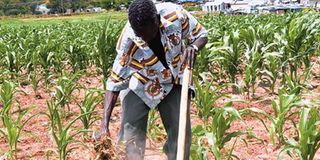Drought resistant maize seed for TZ

A farmer tends his maize crop. Tanzania is among seven African countries where drought tolerant maize seeds will be produced for distribution across the continent. PHOTO | FILE
What you need to know:
The multi-million dollar project will be implemented by the International Maize and Wheat Improvement Centre (CIMMYT), through its regional office in Nairobi, in collaboration with the International Institute for Tropical Agriculture (IITA).
Arusha. Tanzania is among seven African countries where drought-tolerant maize seeds will be produced for distribution across the continent, The Citizen was informed here at the weekend.
The multi-million dollar project will be implemented by the International Maize and Wheat Improvement Centre (CIMMYT), through its regional office in Nairobi, in collaboration with the International Institute for Tropical Agriculture (IITA).
Drought Tolerant Maize for Africa Seed Scaling (DTMASS), as the project is known, will produce nearly 12,000 tonnes of certified seed for approximately 400,000 households (or 2.5 million people) in Tanzania, Ethiopia, Kenya, Malawi, Mozambique, Uganda and Zambia.
“The success of getting drought-tolerant maize goes beyond the breeding work. Our work now is to ensure that maize farmers benefit from the seed that was developed with them in mind,” said the project team leader Dr. Tsedeke Abate in a dispatch from Addis Ababa.
He said getting the drought-tolerant maize and other improved seeds to the farmers in Africa was critical in addressing hunger and specifically cereals shortage caused by repeated or prolonged droughts across the continent.
Dr Abate, who works with the Ethiopian Institute of Agricultural Research (EIAR), said despite the poor weather in some years, maize production in Africa was growing rapidly, making it the most widely cultivated crop in the continent and a staple food for more than 300 people.
“Giving farmers improved seed choices that will increase their maize yields is a guaranteed pathway to strengthening Africa’s food security,” he said, adding that the maize stroy for Africa’s breadbasket was “changing for the better.”
The expert didn’t give the cost and time-frame for implementation of the new maize seed project which will commence on the heels of winding up of the Drought Tolerant Maize for Africa (DTMA) project which has been implemented for the last eight years.
Through it more than 200 improved maize varieties have been bred and distributed to help farmers cope with climate change and low-fertility of the soils. This, according to experts, contributed to stronger food security in 13 African countries, including Tanzania.
“Africa’s food security faces a host of challenges but, undoubtedly, drought is the most devastating challenge because our farmers rely on rains to grow their food. The work undertaken by DTMA has created significant impacts”, said Dr. B.M.Prasanna, the director of CIMMYT’s Global Maize Programme.
He said from Addis Ababa that although the project was being concluded, CIMMYT, a global agricultural research body based in Mexico, would continue it maize improvement programmes in sub-Saharan Africa “to ensure farmers can access improved maize seed with drought-tolerance and other relevant traits that contribute to increased and stable yields.”
Agricultural experts, development partners and international funding agencies are meeting in the Ethiopian capital from today (Monday) to take stock of DTMA which has been implemented since 2007. Besides Tanzania, other countries covered by the project are Angola, Benin, Ethiopia, Ghana, Kenya, Malawi, Mali, Mozambique, Nigeria, Uganda, Zambia and Zimbabwe.
Of the eleven maize varieties released in Ethiopia by DTMA, six are reported to be high-yielding hybrids that will contribute to improving food security for more than nine million smallholder households currently growing maize for food and income.
The meeting will also review the progress made under the Improved Maize for African So8ils (IMAS) project which will enter a new phase next year. The project focuses on amplifying benefits for maize farmers by stacking both drought tolerance and nitrogen use efficiency, according to its leader Dr. Michael Olsen.




